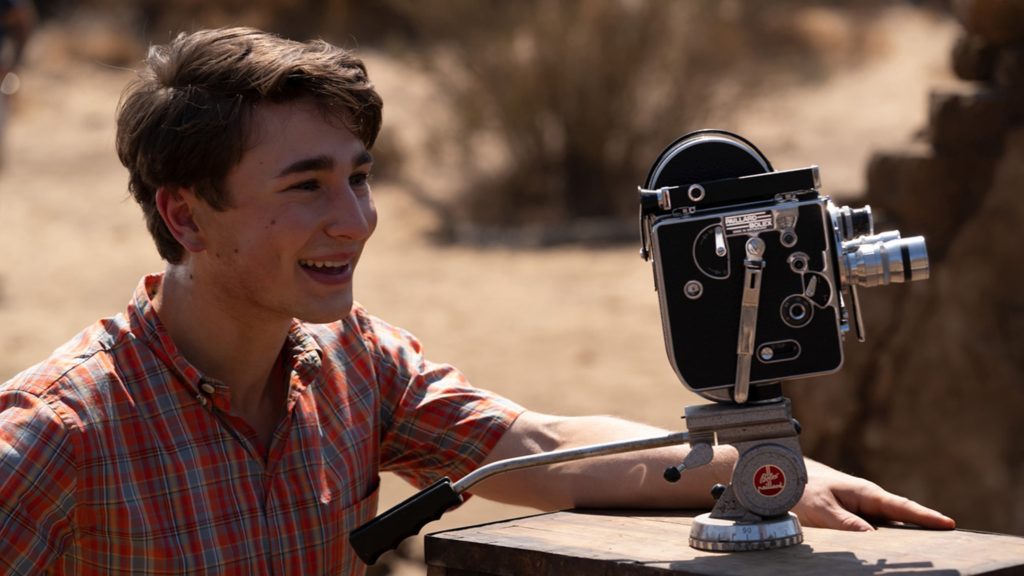It is noteworthy on multiple levels that Steven Spielberg has a writing credit on The Fabelmans. Through his long and varied directing career that still nonetheless feels like the whole of a specific vision, he has astonishingly few writing credits: Close Encounters of the Third Kind, AI: Artificial Intelligence, and now this. (Also a couple of Richard Donner films.) I have no doubt he’s touched up the scripts he’s directed, but an actual writing credit is something special.
The first reason his writing credit here is important is because it speaks to just how autobiographical this film is to Spielberg and how essential it is to his vision of cinema. The Fabelmans is riding a bunch of narrative tracks at once — a coming-of-age period film, a melodrama, a history of cinema, a history of Steven Spielberg, a history of Steven Spielberg cinema — and all of them add up to a tribute to the great director’s career. (Counterintuitively, melodrama and coming-of-age dramedy have not been frequent genres of choice for Spielberg, even though themes common to those genres are always hanging around his films.)

The second reason I think it really matters that Spielberg has a writing credit on The Fabelmans is that it speaks to the biggest hangup I have with the film, which is that it’s not an especially great screenplay. Spielberg is not a screenwriter by trade, he’s a director! The fact of Spielberg being by his very nature a director, a manipulator of moving images, is the central point of the movie! I’m not saying someone else should have written this script, but it does feel a bit uneven as a piece of writing: It lays its themes on extremely thick and bluntly; certain characters (especially Seth Rogen’s Benny) are very rough sketches; and the dialogue is not especially sharp.
Thankfully, literally everything else about the movie is working to make the writing seem better. The acting is phenomenal. Michelle Williams as Mitzi, the mother of protagonist Sammy (Gabriel LaBelle), is the standout — her face is framed by an odd little bob that accentuates the huge expressiveness of every minute gesture of her eyes, and Williams is bringing everything. But I also found myself really rooting for Sammy thanks in part to LaBelle’s ability to project curiosity and dignity. Paul Dano, as usual, is fully subsumed in his character, Sammy’s dorky dad.

The moments that work best in the film are the sequences where we see Sammy process some aspect of his reality through film. It is always enrapturing to see these actors stare at moving images, as if the divine is speaking to them from on high. There’s one particular scene in which Sammy learns something important about his mother that stands among the upper tier of Spielberg’s great scenes.
One quirk of the film — I’m not sure whether to label it a “flaw” — is that it is totally dependent upon the viewer’s knowledge that this is “A Steven Spielberg Film!” It doesn’t especially stand on its own because it’s not really designed to: You watch The Fabelmans with the context that this is a movie made by one of the great directors looking back on his path to his art. I can’t even fathom going in blind, stumbling upon it on cable and wondering what’s the big deal about this protagonist making rinky-dink movies. It’s a Russian nesting doll of cinema — a movie about a guy who loves movies making movies made by a guy who loves making movies.

The very final scene in particular is victim to this. It is dependent not just on your knowledge of Spielberg, but of two other great directors, and if you are not in immediate awe of all of the involved parties, it’s going to come across as a bit of a head-scratcher. In context, it’s quite moving, genuinely capturing a feeling a reverence for the giants of cinema past whose shoulders are necessary for the creators of today.
I like The Fabelmans a lot. I wish I loved it because I am quite fond of the idea of it — a summation and late-career thematic retrospective of a life devoted to the craft told via coming-of-age epic. Yet I don’t quite adore it as a complete package. It’s a bit too clunky and obvious when it relies on words. But when it soaks in Spielberg’s images — a crashing train, a dancing woman, a walk to the horizon — it’s transcendent.
- Review Project: 2022: Year in Film
Is It Good?
Very Good (6/8)
Follow Dan on Letterboxd or Twitter. Join the Discord for updates and discussion.


One reply on “The Fabelmans (2022)”
I didn’t know it was David Lynch when I saw it, and now that I do, I still don’t care. (I barely care about John Ford.) That scene’s grown on me anyway, a little, though I still think I’d like to have seen more of “Sammy Fabelman’s” actual early career.
It’s pretty good at being a kid’s familial melodrama, though! Williams is off-the-wall good–a very well-honed tool for her director, in that she’s somehow both a figure of empathy and sometimes awe (sometimes, uh, redacted), and thornier feelings of reemergent contempt. I do appreciate the rawness of this movie, even if it’s half-memoir half-therapy. I agree about the importance of paratext here. I’ve always had some vague notion about how great it would be if movies could be seen under blinded experimental circumstances, but this is one I’d really love to have somehow seen people react to it without any names on it or (even more somehow) without a preexisting awareness of who Steven Spielberg is.